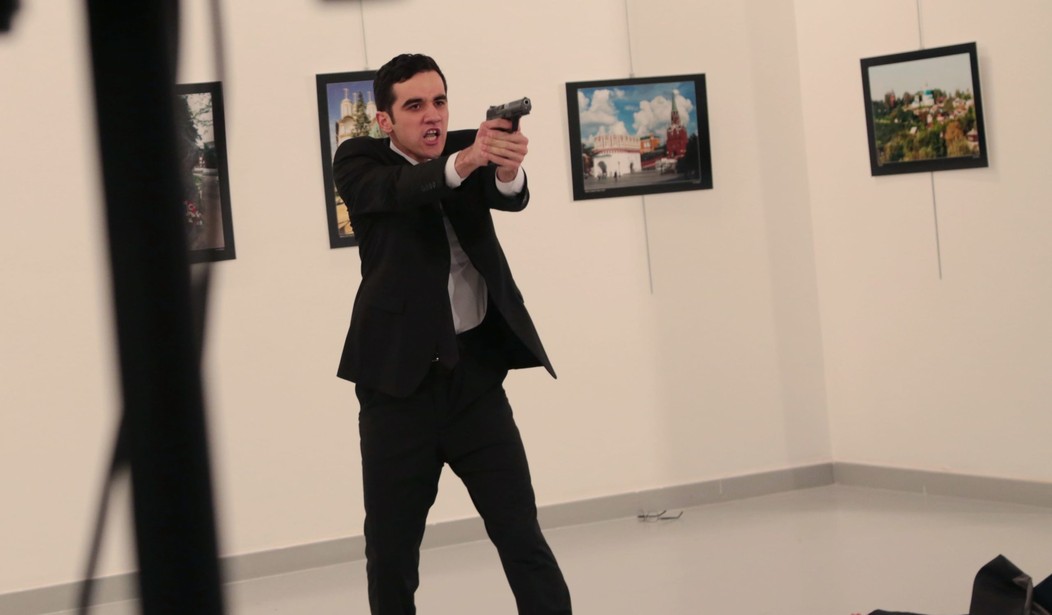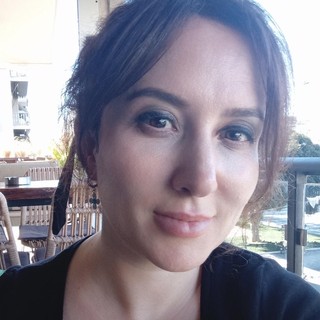Russia’s ambassador to Turkey, Andrey G. Karlov, was assassinated at an Ankara art exhibit on December 19 by a Turkish gunman shouting “Allahu akbar” [Allah is the greatest!].
The assassin, who was a special forces police officer, quoted the Hadith, a record of the words of Islam’s founder Muhammad: “We are those who have given a pledge of allegiance to Muhammad that we will carry on jihad.”
One of the first bits of information that came out following the assassination was that the murderer had worked as one of the top security guards of Turkish President Recep Tayyip Erdogan on at least eight occasions.
But how did a police officer and former security guard of the president of Turkey, which is a NATO member, end up being the jihadi murderer of a diplomat whose protection was the responsibility of Turkey?
A few days before the assassination, a video of another Turkish police officer, who completed a special forces class in August, was widely posted on social media.
“We have nothing to do with salaries, money or worldly things,” said the police officer. “Our path is the path of Allah. And our army is the army of the Prophet [Muhammed]. As long as we have this faith and determination, nobody — no state, no organization, no terror group — can destroy us. They can’t even dare do that.”
Other members of the special forces were heard repeatedly chanting “Allahu akbar” during their training.
On December 11, the pro-government newspaper Yeni Akit covered the statements of the police officer, calling it “a speech by a special forces police officer that articulated the feelings of millions of people.”
Another video of Turkish schoolchildren chanting an Islamic song at a hight school that offers an Islamic curriculum to pupils in the Bagcilar neighborhood of Istanbul was also posted on social media recently.
The children chanted: “The Koran is in our hands, the faith is in our hearts, we are Muslims, Muslims. Long live Islam! Allahu akbar, Allahu akbar!”
Yeni Akit included a link to the video on its website, under the headline: “A video of Imam Hatip students that makes one proud: Long live Islam.”
The children had their index fingers on their right hands pointing skywards, which represents their affirmation of Islam recited before every prayer: “There is no God but Allah, and Muhammad is his Prophet.”
The salute is also used by members of the Islamic State (IS) and was even used by its leader, Abu Bakr al-Baghdadi, during his first speech at Friday prayers after the takeover of Mosul. Moreover, it is not only used by fighters and supporters of IS but by those celebrating weddings in IS-held areas.
The salute “has a solid jihadi pedigree,” said Rita Katz, director of the SITE Intelligence Group. “The gesture has been used by jihadis for years, including high-profile ones like Osama bin Laden. Within the jihadi context, the raised index finger takes on political meaning as well, widely rejecting any form of government not under Shariah law.”
Mustafa Yilmaz, the head of the directorate of national education of Bagcilar, however, told the newspaper Hurriyet: “There is no abnormality in the video. The children did such a thing on their own in the break. This is an Imam Hatip school. There is nothing wrong with what the children said. It is a melody sung by Muslims. And the children sing that melody. It is nothing ideological; the children are just reading a poem.”
Meanwhile, a Turkish elementary school teacher, Aydin Erekmen, working in Istanbul’s Basaksehir district, posed with his students holding nooses. He shared the picture on his social media account, saying they “want justice,” shortly after the December 10 terror attack in Istanbul.
The teacher and his students were asking for the death penalty to be reinstated. In another photo the teacher posted, the students are also seen making the “Islamic index finger salute.”
Erdogan, then the prime minister, made headlines in 2012 when he said he aimed to raise “a pious generation.” But raising “pious” (or, in other words, Islamic) generations already began a long time ago with the founding of the officially “secular” Turkish republic in 1923. This process was facilitated and escalated by exterminating more than 3.5 million Armenian, Assyrian, and Greek Christians during the genocide between 1913 and 1922.
First Imam Hatip schools founded in 1924
The first Imam Hatip schools in Turkey were opened in 1924 during the rule of the country’s first president, Mustafa Kemal Ataturk. The word hatip comes from the Arabic khatib, meaning the one who delivers the khutba, the Friday sermon in the mosque. As the name suggests, the schools were founded as vocational schools to train government-employed imams and Islamic scholars.
Under Erdogan’s Justice and Development Party (AKP), the number of Imam Hatip schools has ballooned from 493 in 2010 to 3,500 today, with enrollment surging from 63,000 to 1,500,000 since the AKP first came to power. The number of Islamic theology departments (Ilahiyat Fakultesi) at universities, moreover, now stands at 14,100, according to Turkey’s state-funded Presidency of Religious Affairs (the Diyanet).
Mandatory Islamic education in Turkish schools
Islamic courses are compulsory in Turkish schools despite the country’s so-called legal commitment to secularism. The “Religious Culture and Moral Knowledge” classes are predominantly based on Sunni Islam, and all school children in primary and secondary schools across Turkey including Alevis, an oppressed religious minority, must attend them.
Representation of the Alevi faith in textbooks
There are serious problems in the textbooks of these classes .
When the Alevi faith is mentioned in any textbook, it is often in very negative terms. For example, a book sent to all teachers across Turkey in June upon the recommendation of the Ministry of National Education (MEB) to be studied and discussed at year-end seminary teacher training refers to the Alevi faith as “tainted” and “rotten.”
“The evil force that has gnawed at tariqas [Islamic paths or doctrines] right at their hearts for centuries is Alevism,” the book states. It adds: “The Islamic world has been the wreckage of those rotten mindsets.”
Representation of Judaism and Christianity in textbooks
According to the 2015 report by the United States Commission on International Religious Freedom, on the compulsory religious education in Turkey in textbooks, “The characterizations of both Jewish and Christian beliefs, sacred texts, and prophets are done through Islamic beliefs rather than through what Jews and Christians believe themselves.”
A brief section in a Turkish textbook describes Christianity as follows: “When Jesus reached 30 years of age, Allah gave him the duty of being a prophet. He then began inviting people to believe in Allah. At the start, only 12 people believed in his call. They are called the ‘disciples.’ The holy book of Christianity is Incil [the Gospels]. The four Incils written by and known with the names of their writers as Matthew, Mark, Luke and John are the most famous…. Christians accept prophethood of other prophets besides Prophet Muhammad…. Christians believe all human beings are born sinners, thus all children are washed with holy water to cleanse from their sins. This is called baptism.”
As the report of the U.S. Commission on International Religious Freedom stresses, according to Christian theology, this description is completely false: “The view of Jesus as a prophet is not what Christians believe, but what Muslims believe. Similarly, the holy book of Christians is not only Incil, but the Kutsal Kitap or Kitabı Mukaddes, the Holy Bible, with the Old and New Testaments as the two main parts. Students are not told where the four Gospels, which are part of the New Testament, fit into the Christian Bible. The expression ‘the most famous; is also confusing, as they are the only ones in the canon of the New Testament; it most likely alludes to the idea that there were Gospels which prophesied Prophet Muhammad but were changed or destroyed by Christians. Similarly, it is not clear what the text means in describing Christians as believing in other prophets besides Muhammad. Also, there is no unanimity in Christianity on the baptism of children, or its meaning regarding salvation from sins.”
In Turkey, where all non-Muslim communities have either been exterminated or are harshly repressed, radical Islamization is escalating daily. While non-Muslim faiths are insulted in textbooks, Islamic slogans that are embraced by organizations such as the Islamic State (IS) and al-Qaeda are shouted at Turkish schools and even at institutions where security officials of the country are trained.
It is this darkness, nurtured by genocidal hate against everything non-Islamic and non-Turkish, which poisoned the mind of the 22-year-old police officer who murdered the Russian diplomat. He was eight years old when the AK party came to power in 2002. When you raise children in an educational system marked by Turkish-Islamic supremacism and murderous hostility against non-Muslims, this is the horrifying result you get.
The authorities who run the Turkish regime have created this atmosphere of fanatic Islamists. Sadly, it seems that it will soon be even harder for them to control the monster that they have created.










Join the conversation as a VIP Member